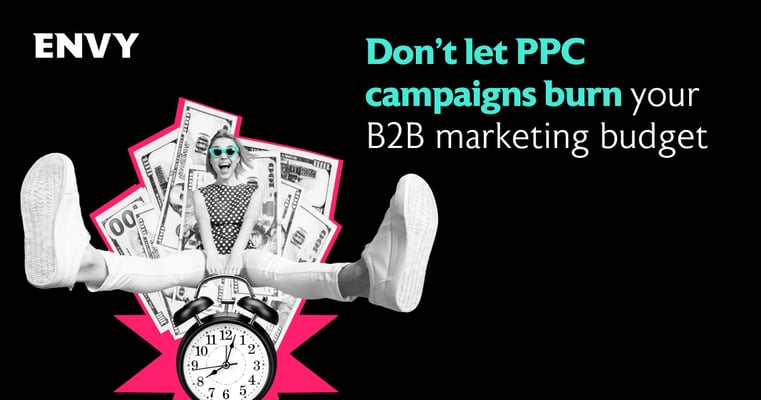
Don’t let PPC burn your B2B marketing budget
What's the right budget for your B2B PPC activities? Let’s cut to the chase, PPC campaigns are not the right choice of lead generation for every company at every stage or budget. The right time is when you’ve got a plan, process, technology, people and budget in place for every stage of the funnel.
Hear us out. We’ve all been bored to death by going over lovely graphics explaining the buyer journey’s stages (the wholy Awareness, Consideration and Decision), but are we actually putting this into good practice? We’re seeing way too many companies investing huge chunks of their marketing budget in PPC, only to target completely new audiences with demo ads. And we all know what happens next. Absolutely nothing. Exactly.
Here’s our proposition, the really big picture:
Start with brand awareness. Offer (ungated!!) valuable knowledge, show people your expertise, help them memorize your brand, for example with videos that show you or your team, your vibe and great sense of humor (or lack thereof, we can’t all be funny after all).
Then use remarketing to those who’ve seen your content, who visited your website, read your emails, attended your events, in short those who already remember what you do. Nudge them a little bit more and help them create a relationship with your brand.
As you go, continue with your inbound marketing, meaning keep releasing new blogs, recording new videos, building your audience and engaging with them on socials. The more recognizable your brand is, the easier it is to reach new prospects. Also, you don’t want to drive leads to your website without having enough content to keep them engaged and hanging around.
And only then run your demo ads, ‘talk to us’ ads, ‘become a customer’ ads. Now that people know your brand, know the value you offer, know the potential of what we can achieve together, they’re much more likely to convert.
3 more things that burn your B2B PPC budget
Truth be told, there’s a lot of things that can make your PPC flop and your budget go to waste: the classic “wrong time, wrong place”, incorrect targeting, dodgy or boring creative, wrong message delivered to wrong people or, like we’ve already stressed above, at the wrong stage. But below, we’ve listed just 3 of our favorite culprits that still get overlooked more often than we’d like.
We really hope we all share that love affair with long-term B2B tech marketing strategy. Or at least if not love, then common understanding will have to do. We can’t get enough of the way inbound nurtures organic leads, but it also lays the necessary foundation of your customer base in the first place.
Just think about it. Let’s say you do have an AMAZING campaign prepped, the assets are better than anything the world has ever seen, the copy attracts people like moths to a flame, and (we’re dreaming big, let us) you even have a huge budget set up. Hopes are getting real high. You publish your campaign. Someone clicks on your ad!!!!!! And then they’re taken to a landing page designed in Paint (no hard feelings) with a copy written by your CEO’s daughter’s friend who graduated from marketing & communications (honors degree, okay????) and has never ever seen what your company does. And they bounce. End of story.
But when your landing page is just as attractive as your ads, if they’re supported by a number of blogs, social posts, newsletters, thought leadership activities (again, we’re dreaming big) - then that’s different, eh? Because your PPC campaign is only as effective as the content behind it.
- Marketing automation
This one’s easy. Us humans, and especially us marketers, like to complicate stuff. And you know what? We’ve complicated the marketing world so much that now we need extra tools to tell us how we’re doing.
Alright, all jokes aside. We’re very much innocent. But we really do need those tools. We don’t know a single marketer who’d be able to monitor and analyze EVERYTHING that’s happening with your performance–and we need that to be able to optimize and improve what’s underperforming and quickly kill what’s underperforming big time (more on this in a moment).
Firstly, automation helps us… automate stuff – send alerts to sales teams when a new lead enters, send out nurture emails through workflows, score leads and much more that is impossible to do manually when running campaigns. It also spots trends and patterns in user behavior, enabling real-time strategy adjustments. It simplifies A/B testing too, letting you compare different ad creatives, keywords, and bidding strategies to see what clicks. Plus, marketing automation can segment your audience based on their engagement levels and behavior, delivering personalized content that resonates with their stage in the buyer's journey.
When you integrate marketing automation with your PPC efforts, every touchpoint is tracked and analyzed, giving you a holistic view of your campaign performance and in turn driving better results and a higher return on your ad spend. Ultimately, marketing automation is essential for making informed tweaks, optimizing your budget, and hitting your marketing goals–and that’s what we all like the most.
- Budget
Ohhh if we didn’t save the best for last!!! In short, your PPC campaigns could bleed you dry, as you throw money away on lead generation campaign on LinkedIn that leads… nowhere. So how much do you need to get somewhere? Honestly, every industry is different and there’s so many things your success depends on, but we generally recommend spending around $15,000 per channel, and here’s why:
| Post promotion on LinkedIn | $2000 |
| Retargeting | $1000 |
| Leadgen on LinkedIn | $12000 |
| Avarage CPL $250 | 48 leads |
| 10-20% Lead to MQL | 4-8 MQLs, monthly |
Yes, $15,000 is A LOT. But 48 leads won’t tell you anything about the performance of your campaign. We usually aim to see an absolute minimum of 100-200 leads to start deducting what’s working and what isn’t, so it takes a good 2-3 months to see, again, very initial results, and 3-6 months to see something more realistic. Anything shorter than that won’t give you enough data to tell you what to optimize or refine in your PPC strategy.
So if you’re not ready to spend 15k (times three!) for 4-8 MQLs, then you might want to consider spending your budget on different activities.
If you do have the marketing dollars you need, set clear goals and establish PPC KPIs to measure your success. Determine your cost-per-click (CPC) and conversion rates, and calculate the potential ROI to ensure your investment aligns with your business objectives. We’ve written more about how to calculate your budget for Google Ads here.
Now, there are two schools on how to approach PPC budgets: one tells you to consider starting with a smaller budget to test different ad formats, keywords, and targeting options. Gradually increase your budget as you gain insights and confidence in your campaign's performance. This may seem like it’s a safe option, but it’s actually more risky as getting insights regarding what’s working/not takes much longer.
That’s why we recommend the opposite of that, which is frontloading your budget. Take months 1 -3 and invest double the amount you will spend in months 4 and onwards. This will enable you to get to what’s working and what’s not way sooner. For long sales cycles, opening the funnel early on is also a huge benefit than trickling the leads in monthly.
Which one is for you, lead gen or brand awareness?
Ah, the never ending question. We made a point earlier about starting your paid activities with brand awareness and while we’re sticking to it, it doesn’t mean you cannot run both at the same time. Because again, when was the last time you invested in something significant from a brand you’d never heard of? Buyers today do their research; they want to be familiar with a brand before initiating contact.
Brand awareness focuses on making your target audience familiar with your brand. It’s about building recognition and trust through consistent messaging and engagement across multiple touchpoints. This sets the foundation for future marketing efforts by ensuring your brand is known and remembered.
Lead generation, on the other hand, is all about the numbers: the leads, SQLs, and demo meetings a campaign generates. It’s the direct, results-driven aspect of marketing. Both brand awareness and lead generation are crucial to your company's marketing and sales success, but they must be measured differently:
| Brand awareness | Lead generation |
| CTR | ROI |
| CPC | CPL |
| Impressions/views | CPMQL/CPSQL |
| Engagement/likes/follows | CPO |
| Brand recognition | Bounce rate/traffic to website |
We’re an experienced B2B PPC agency, of course we’re in favor of PPC campaigns 😉 When choosing a partner, look for someone that understands your industry, has a proven track record, and aligns with your business goals. Wink wink, that sounds A LOT like Envy.
Ready to take the plunge? Sign up for a free consultation with one of our PPC experts and discover how we can help you achieve your marketing goals.





.png?width=352&name=Nuvei%20blog%20cover%20(1).png)
